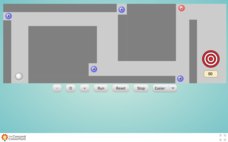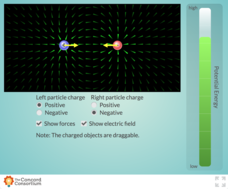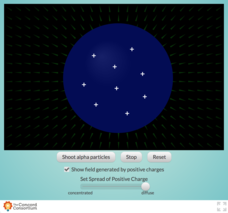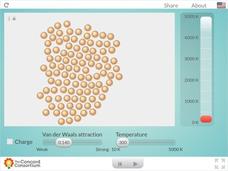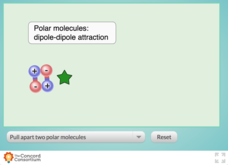Concord Consortium
Electrostatics: Maze Game
Ready to have an a-MAZE-ing time teaching electrostatics? Introduce physical science superstars to an engaging resource that tests their knowledge of attractive and repulsive forces. Pupils change the charge of a ball to guide it through...
Concord Consortium
Charge Intensity and Electric Force
Looking for a quick way to supercharge your electricity and magnetism unit? Assign a very responsive interactive designed to illustrate the relationship between charge, electric field, and the resulting forces. Learners experiment with...
Concord Consortium
Atom and Ion Builder
Explore and control the building blocks of atoms! Physical science superstars add and remove subatomic particles to create atoms and ions with an easy-to-use interactive. An alternate activity includes an assignment that focuses on the...
American Chemical Society
Great Electron Ripoff
Create a charge in the classroom. Using pieces of cellophane tape, a plastic grocery bag, and a balloon, learners investigate the effects of static electricity. Pupils create different charges in the materials and observe whether they...
American Chemical Society
Colors on the Mooove!
It does a mind good! Learners experiment with a combination of food coloring, detergent, and milk. They observe how the food coloring reacts with the different liquid combinations and relate their observations to the charges on the fat,...
Physics Classroom
Charge and Charging
Does your class understand how things become charged? Are you positive? Before negative grades emerge, assign a fun interactive! The first in the five-part Static Electricity series contains three levels of charge-related questions and...
Physics Classroom
Polarization
Are your young physicists static-savvy? Test their skills using an engaging interactive from the Static Electricity series! Learners evaluate scenarios to determine how charges move between conductors and insulators, then identify...
Physics Classroom
Charge Interactions
Has your class been repelled by your previous magnetism lesson plan? Try a fun interactive instead! The activity, part of the Static Electricity series, challenges scholars to infer the charges of a group of magnets based upon their...
Concord Consortium
Electric Potential Energy and Type of Charge
Scholars are sure to get a charge out of an electric lesson! They examine the potential energy of charged particles while they make changes to the electrical field. The simulation allows them to change the position of particles and the...
Concord Consortium
Direction and Strength of Force in Electric Fields
Finally, a helpful tool for modeling electric fields! Young physicists explore the unseen world of magnetism via a simple interactive. Individuals move a charged object around a stationary object and see the strength and directions of...
Concord Consortium
Direction of Force Around a Van de Graaff—Negatively Charged
Learn about the direction of magnetic force with a very attractive interactive! Young physicists move a positively charged object around a negatively charged Van de Graaff generator and observe the direction of the forces present. A...
Concord Consortium
Concentrating Charge and Electric Fields
How did Rutherford determine that the nucleus was the center of an atom? Take a look inside the famous Gold Foil Experiment with an interesting interactive. Learners fire a beam of alpha particles at a nucleus containing variable...
Concord Consortium
Direction of Force on Charged Objects
Make your unit on magnetism a force to be reckoned with! Physical science scholars examine the direction of force on charged objects through a simple interactive. Pupils control the charge of the stationary object, then observe how it...
Concord Consortium
Opposites Attract
Whether they pull together or push away from one another, magnets are sure-fire pupil pleasers! Take their study of magnetism to a new level with a fun interactive. Individuals control the polarity of two spheres to observe attractive or...
Concord Consortium
Visualizing Electric Fields and Forces
Shock your class with an exciting interactive about electric fields! Physical science superstars visualize the transparent world of electric fields by changing the charge on a stationary object. They then observe changes in the resulting...
Concord Consortium
Sticking a Balloon to a Wall
This is one sticky situation! Science sleuths uncover the mystery behind a balloon that appears to be stuck to a wall using an interactive. Learners observe a neutrally charged wall before they manipulate the charge on a balloon. Atom...
Concord Consortium
Crooke's Tube
Behold, the electron is discovered! Take young scientists on a journey back through time to examine JJ Thompson's famous experiment using a Crooke's tube. Pupils manipulate the charge on the apparatus' horizontal plates, observe cathode...
Concord Consortium
Deformed Electron Cloud
Dispel the misconception that atoms are always little round balls! Illustrate changes in the electron cloud with an entertaining interactive. Pupils push and pull on the cloud by altering the charge on plates located on either side of...
Concord Consortium
Exploring Electron Properties
Bring a historic chemistry experiment to life in your classroom! Introduce pupils to Thompson's ground-breaking discovery of the electron through a cathode ray simulation. The resource allows users to study the behavior of both electrons...
Concord Consortium
Charged and Neutral Atoms
Do charged and neutral particles behave differently as they undergo phase changes? Science sleuths examine two types of attractive forces using an informative interactive. Pupils can vary the amount of Van der Waals attraction present...
Concord Consortium
Polarity and Attractive Strength
Teaching intermolecular forces can be quite a stretch! Chemistry scholars experiment with the attractive strength between polar molecules using an interactive resource. Learners test molecules of low, medium, and high polarities by...
Concord Consortium
Comparing Dipole-Dipole to London Dispersion
Which intermolecular force is the strongest? Scholars test the relative strength of London dispersion forces, dipole-dipole interactions, and induced dipoles using a simulator. The interactive allows learners to pull on paired molecules...
Concord Consortium
Seeing Intermolecular Attractions
Ahh, the rules of attraction...intermolecular attraction! Introduce your chemistry crew to the other forces that influence the behavior of atoms and molecules alike with a simple interactive. Pupils push and pull polar and non-polar...
Concord Consortium
Conversion of Electric Potential Energy
Here is a resource that is full of potential energy! Learners manipulate charged objects to convert electric potential to thermal energy using a savvy simulation. The resource includes a variety of charge settings and helpful potential...


